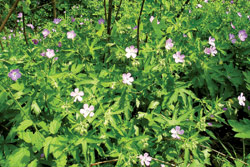When someone asks where I’m from and I say, “Born and bred here,” the usual response is, “Oh, I rarely meet natives.” Perhaps you should visit Cherokee, I often want to quip. Those folks are certainly more native than I, even if my family roots do go back several generations in Western North Carolina.

But in our rapidly mobile world, almost everyone is a foreigner (or “exotic,” as gardeners say). The same holds for most of our more common garden plants. We assume that many of the plants gracing our yards, developments and side roads are from here simply because they grow here.
Not true: For the most part, they’ve been brought here. Relying primarily on seed dispersion, plants don’t generally vault across oceans or mountains on their own. And if they could ask each other where they’re from, they’d give exact coordinates. You have that Wisteria floribunda because someone bred it in Japan, and it was brought here and then marketed and sold it to you.
Fortunately, we have plenty of native plants in North Carolina: more than 4,000 species across the state (including about 1,000 here in WNC), according to the North Carolina Native Plant Society. Statewide, some 700 of those species are rare. Some plants are naturally rare, growing in specialized areas such as bogs or rock outcrops. But rare also often indicates that the plant’s natural habitat has been converted to other uses, or that the natural processes on which the plant depended have been altered or controlled—wildfire suppression, for example. Of those 700 rare plants, 162 are listed as threatened or endangered: They’re either at risk of extinction or likely to become so.
Many things threaten our natives, most notably the human footprint: development, farming, paving, invasive exotic species and logging (full disclosure: I’m married to a forester, but he would rescue the last lady’s slipper before logging anything). Exotics have left their natural predators and diseases behind—the very things that kept them in check back home—and with those gone, we’re left with a simple equation: Fast-growing, fast-seeding exotics can change the local ecology and thus endanger native plants.
But those Chinese-bred peonies at Lowe’s are really pretty. What to do?
Simple: If you’ve been gardening for years but have never given natives a thought, try it. Ask around to see what might fit in your garden, and check with local nurseries. Or visit www.ncwildflower.org.
Oh, and tour some gardens. One of my favorites is The Corneille Bryan Native Garden at Lake Junaluska. It’s a small garden with absolutely everything labeled, so it’s easy to learn what’s what. There are also The Botanical Gardens at Asheville and The North Carolina Arboretum at Bent Creek. Both these gardens give you a chance to check out native plants and examine their growth habits. They also have yearly plant sales: After deciding on a few favorites, you can buy natives from reliable sources.
Of course, if you’re like me, you often wind up buying every pretty plant you see at a nursery. But with all the environmental issues we face, we really do need to buy responsibly (think kudzu, the exotic vine that ate the South, or bugleweed, another fast-spreading invasive species I have in my own garden). So check out the list of invasive exotics on the above-listed Web site and keep it in mind when you buy. Perhaps you’ll end up choosing Allegheny spurge, a nice native ground cover, instead of bugleweed.
And while I will admit to having joined my mom and her best friend, Sandra, in digging up lady’s slippers and collecting galax leaves in the wild—a fun trip and a common practice among us WNC natives when I was growing up—I don’t recommend it now. First, transplanting natives rarely works. Second, since so many are endangered, it’s best to buy them from a reliable source and let the ones you stumble on keep growing grow right where you found them. In other words, leave a little less of that human footprint.
Finally, it’s not about giving up exotics entirely. I just spent the morning transplanting some hostas, which hail from Japan, China and Korea. And I wouldn’t give up my non-native peonies, period. So don’t go digging up every exotic in your yard and tossing it on the compost pile. If you like your ‘Kwanzan’ cherry, enjoy. Just don’t forget the natives when you’re planting.
[Cinthia Milner lives in Leicester.]



Before you comment
The comments section is here to provide a platform for civil dialogue on the issues we face together as a local community. Xpress is committed to offering this platform for all voices, but when the tone of the discussion gets nasty or strays off topic, we believe many people choose not to participate. Xpress editors are determined to moderate comments to ensure a constructive interchange is maintained. All comments judged not to be in keeping with the spirit of civil discourse will be removed and repeat violators will be banned. See here for our terms of service. Thank you for being part of this effort to promote respectful discussion.